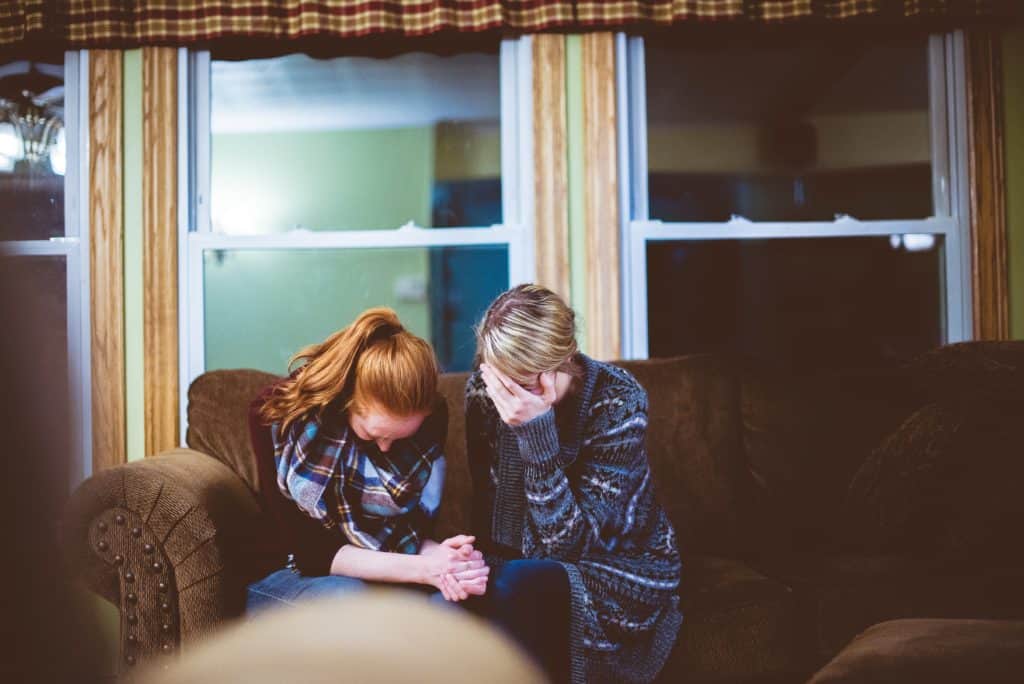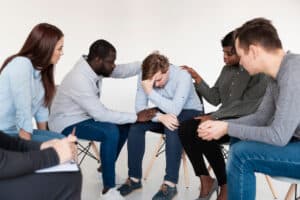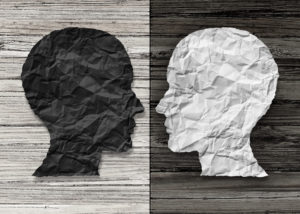Since depression isn’t a physical ailment, sometimes it can be tough to notice. Chances are someone you know is dealing with depression and you might not even have any idea. In addition, the person who is suffering from depression might not realize it either. They might feel just feel “off” a lot. In fact, depression does not look like any particular expression, type of person, or symptom. Also, it’s not as simple as a “bad day” or “rough life”. Unfortunately, too many people who have depression don’t get the treatment they really need. Many times these individuals turn to drug use or alcohol abuse to self medicate the way they are feeling. Not only does this prevent individuals from solving the depression issue, but it can also lead to even more issues. Using drugs or alcohol to self medicate for depression can lead to substance abuse and addiction.
If you or someone you know is suffering from depression, the best course of action might be to seek treatment at an addiction and depression treatment center in California. In this blog, we will take a look at depression and learn more about treatment for it.
What is Depression?
Depression is defined as a common and serious medical illness that negatively affects how you feel, the way you think, and how you act. Depression causes feelings of sadness and/or a loss of interest in activities once enjoyed. It can lead to a variety of emotional and physical problems and can decrease a person’s ability to function at work and at home.
Depression affects an estimated one in 15 adults in any given year and one in six people will experience depression at some time in their life. While depression can strike at any time, it typically appears during the late teen to mid-20s years and is more common in women than men.
Dual Diagnosis: Depression and Addiction
As we mentioned earlier, many people who suffer from depression use alcohol or drugs in order to cope with their mental illness. It can be very difficult to perform even the most “normal” day-to-day activities when you’re suffering from depression. Simply getting up in the morning or preparing for a social gathering can be challenging. Often, people turn to substance use in order to make it through the day.
Although this seems like the solution to the problem, it can just cause another major problem: addiction. When a person is struggling with addiction and depression, he or she has what professionals call a “dual diagnosis”. Individuals who suffer from co-occurring disorders may experience intensified symptoms of these disorders. So, if you are dealing with addiction and depression, you may feel very different symptoms than someone who is only dealing with one of these issues.
Often, people who suffer from the effects of depression experience intense sadness. They may also become irritable and anxious regularly. Their family members and friends may find it hard to understand why the individual feels these emotions. As a result, some people may withdraw from their loved ones. They may begin spending more and more time alone. This can increase the intensity of their symptoms. In turn, individuals may begin to resort to alcohol or drug use to try to “fill the void” in their lives.
Using drugs or alcohol to treat depression can do much more harm than good. It’s likely that those who self medicate this way will develop a substance dependence problem. This is why it’s so important to seek help. If you’re struggling with depression and substance abuse, now’s the time to find hope. If you’ve been looking for addiction and depression treatment centers in California, Northbound Treatment Services can help you.
How Do I Know If I Have Depression?
This can be a tough question to answer because depression doesn’t look or feel the same for each one who suffers from it. Depression can mean different things to different people. If you find yourself not “feeling like yourself” for prolonged periods of time, you might suffer from depression. In addition, if you find that it can be hard to just get out of bed and get your day started, it might be depression-related.
Typically, if you find yourself experiencing any of the following, you might be suffering from depression:
- Fatigue
- Irritability
- Restlessness
- Trouble concentrating
- Overeating, or appetite loss
- Difficulty remembering details
- Trouble making decisions
- Pessimism and hopelessness
- Suicidal thoughts or attempts
- Persistent sad, anxious, or “empty” feelings
- Feelings of guilt, worthlessness, and helplessness
- Loss of interest in things once pleasurable, including sex
- Aches, pains, headaches, or cramps that won’t go away
- Digestive problems that don’t get better, even with treatment
- Insomnia, early-morning wakefulness, or sleeping too much
If you’ve noticed any of these symptoms in your life, it may be time to reach out to professionals for help. By doing so, you can get clear guidance concerning your situation.
What Should I Do If I Suffer From Depression and Addiction?
Perhaps you think you may be experiencing depression symptoms as well as symptoms of substance abuse. If this is the case, it’s important that you take the right steps to get the help that you need. So, what are the right steps? Well for starters, the first crucial step is to meet with a clinician. A clinician can determine the best course of action based on your symptoms. He or she can lay out all the different treatment options that are available to you. In addition, a clinician can answer any questions that you may have as you work to manage your depression.
Should I Get Inpatient Treatment for Addiction and Depression?
One of the options that a clinician might recommend for your depression is inpatient treatment. Your mental health is just as, if not more, important as your physical health and it’s important that you treat it as such. If depression is affecting your life negatively in any way, there is enough reason to talk to a doctor about your experiences and the possibilities for recovering the life you want.
That’s where inpatient treatment comes in. With inpatient treatment for depression, your sole focus during treatment is to find ways to get back to living your life the way you want to, and not the way your depression wants you to.
What Are Some of the Benefits of Inpatient Depression Treatment?
Treatment for depression can come in many different forms, one of which is an inpatient depression treatment center. Depression, major depression, and high-functioning-depression are just a few of the many mental health disorders that inpatient treatment centers are designed around. By going to an inpatient depression treatment center, you are surrounded by people that have your well being and best interests in mind. Being in an immersive inpatient depression treatment setting can help your fresh treatment and lifestyle to really settle in before you return to life outside of those walls. At that point, you’ll have a complete after-care plan that you can feel confident will keep you moving in the right direction of recovery.
What Are Some Other Benefits of Inpatient Depression Treatment?
- Focus on the family – Getting treatment for your depression offers help for both you and your family. It offers each individual the opportunity to cope with the effects of depression. Also, it helps to educate those closest to you as you learn how to work through these effects.
- Socialization – By being at a facility with other people, you will be able to socialize and learn ways to not let your depression make you feel alone
- Transition planning – A depression treatment center will work with you to make sure you have an individual treatment plan for when you go home.
Other Treatment Options
Individuals who are suffering from addiction and substance abuse may also benefit from outpatient treatment. Sometimes, those who complete residential treatment proceed to enter an outpatient treatment program.
Like inpatient treatment, this kind of program helps individuals to develop the skills they need in order to deal with the effects of dual diagnosis. It’s different from inpatient treatment in that it doesn’t require individuals to live at a rehab facility. Still, outpatient treatment can help people to focus on getting better and improving their emotional and physical health.
Whether an individual goes through residential rehab, outpatient treatment, or both, there is hope! So, if you’ve been suffering from addiction and depression, please reach out today.
What Can I Expect at an Inpatient Depression Treatment Center?
Although psychotherapy, support groups, and psychiatry can all be useful in treating depression, sometimes the individual benefits from a higher level of care. This is where an inpatient treatment center can come in. At a treatment center for depression, individuals are offered professional care to help them recover. Through various methods of therapy such as cognitive behavioral therapy (CBT), interpersonal therapy, psychodynamic therapy, and more, the person works with a trained clinician to address their experience and builds a life of recovery.
In many cases, medications such as antidepressants and mood stabilizers are prescribed. These medications are prescribed by a trained psychiatrist at the treatment center, and the person’s state of mind is closely monitored to see the way the medication is working. Together with the support network and therapy offered, the person can slowly begin to climb out of the depressed state.
When to Seek Inpatient Treatment for Substance Abuse and Depression
Before seeking inpatient treatment for depression and addiction, it might be beneficial to meet with a psychologist. As you build a relationship with a therapist, they will get to know you and your situation and can ultimately determine if inpatient treatment is right for you. While the signs for depression tend to be universal, we are all unique individuals, and therefore require individualized treatment. While something might work for one person, that same thing might not work for someone else. Regular visits with a therapist or psychologist will allow them to get to know you and your patterns and determine the best course of action.
The only way to truly know the best way to get the help you need though is to reach out. If you don’t tell someone that you need help, then chances are it will never happen. We can guess all we want, but the truth is that we generally can’t see the situation as clearly as an objective, trained third-party can. Although you may not feel that you need inpatient treatment, it could perhaps be beneficial.
What Happens When Inpatient Treatment for Depression Is Best?
If it’s been determined that inpatient treatment is the best course of action to treat your depression, it’s important to remember that you are not alone. The thought of inpatient treatment can be scary and overwhelming. You are essentially putting your life on hold to enter a facility for a certain amount of time where you will spend all your time. Luckily though, you don’t have to go through any of it alone. There are professionals out there to walk you through your situation and guide you through your treatment. It’s important to remember that. although it may not feel like it, depression can be treated. Sometimes it takes time and finding what works, but there are many methods of depression treatment, and psychologists and neuroscientists are continuing to learn more every day.
Why Go to a Depression Treatment Center in California?
If you or someone you know suffers from depression, it is important to get the proper help so you don’t have to suffer from depression for even another day. Self-medicating with things like drugs or alcohol can lead to more serious issues while still not solving the depression issue at hand.
Northbound Treatment Services is here for anyone who has been looking for addiction and depression treatment centers in California. Here at our facility, our number one priority is getting you the help you need so you can go back to enjoying your life again. That’s why we offer inpatient treatment for depression. For more information about or depression treatment, or to talk to someone about your depression, contact us today at (866) 511-2458.
Author
-

President, CEO & Founder at Northbound Treatment Network
Paul Alexander is the CEO, President & Founder of Northbound Treatment Network in Newport Beach, California. He believes wholeheartedly in transformational leadership, organizational health and effective, fully integrated substance use disorder and mental health treatment. With over 27 years of experience in behavioral healthcare, Paul has extensive knowledge of “in vivo” treatment modalities, clinical development, operations, strategy, marketing and financial planning. He has been widely recognized for his development of collegiate-based residential treatment programs for students in recovery and authored a research study at The University of California confirming this modality’s effectiveness.
Paul’s comprehensive professional experience, willingness to innovate, and emphasis on organizational health are vital factors in Northbound’s continued success. Paul received his Certified Addiction Treatment Specialist training at Saddleback College in Mission Viejo, CA, and was awarded Outstanding Alumni Service Award in 2002. Paul holds a Bachelor of Arts degree in Criminology, Law and Society, Summa Cum Laude, from University of California, Irvine, and a Juris Doctorate degree from Loyola Law School of Los Angeles. Paul currently serves on The National Association of Addiction Treatment Providers (NAATP) board. In addition, he serves on The Family Recovery Foundation board and The CarePossible board in Orange County; both organizations are committed to raising funds for family recovery and treatment for former military personnel. Paul is in recovery himself and lives in Orange County with his wife Silvana and his two young sons, Noah and Dean.










